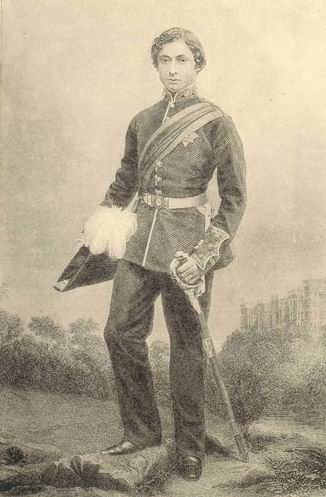|
1999-2003 (Return to Web Text-ures) |
Click Here to return to |
|
1999-2003 (Return to Web Text-ures) |
Click Here to return to |
THE PRINCE OF WALES BALL, OCTOBER 18, 1860.

From a print. Collection of
Massachusetts Historical Society
THE PRINCE OF WALES (KING EDWARD VII) AS A COLONEL IN THE ARMY.
The scrap-book of some Boston family probably contains the dance card of the Prince of Wales which a lady stole to preserve as a memento of the great ball given on October 18, 1860, in the Boston Theatre, on the corner of Court and Hanover Streets. Bostonians endeavored to have this ball outshine in splendor the one given by the New Yorkers, and from all accounts they were successful. The decorations were quite wonderful, a large picture of Windsor Castle being specially admired by the visitors, and the Prince pointed out to several people where his particular room was in the Castle. One eye-witness described the ball as a great crush. The only accident of the evening happened shortly after the arrival of the Royal party. While Mr. Zerrahn’s noted orchestra was playing, some one upset a vase of flowers in front of the Royal box, scattering water and leaves over the Prince, who made light of the mishap. The Prince entered on the arm of the Hon. R. C. Winthrop, and opened the ball by dancing a quadrille with Mrs. Lincoln, the wife of Mayor Lincoln. His partners for the other sixteen dances were as follows: Mrs. Banks, wife of Governor Banks; Mrs. Wise, a daughter of the Hon. Edward Everett; Miss Fanny Crowninshield, Miss Susan Amory, Miss Carrie Bigelow, Mrs. T. E. Chickering, Mrs. Harrison Ritchie; Miss Lombard, the Mayor’s niece; Miss Fanny Peabody, daughter of George Peabody of Salem; Miss Mary Crane; Miss Kittie Fay, daughter of the Hon. R. S. Fay; Mrs. C. F. Chickering; Miss Appleton, Mrs. Isaac C. Bates and Miss Nellie Gage. One of these partners was so beautiful that the Prince wished to have a second dance with her but the committee objected. The younger set of girls looked with jealousy upon those who were old enough to attend the ball, and were anxious to learn all about it. Many fathers sought the opportunity for their daughters to meet and dance with the Prince of Wales, and loud were the complaints of those who were disappointed. The committees in charge of the balls that were held in the various cities were blamed because the members in charge introduced only their own friends to the Prince. At one place (not Boston) the following amusing piece of poetry appeared:—
|
“Sought not his
taste to please, |
The Prince, who was only nineteen years of age, was most attractive and danced unusually well, therefore it was not surprising that he remained at the ball until after four o’clock. As he left, the band played “God save the Queen.” The managers were as follows:—
|
James W. Paige |
George Blagden |
E. M. Dennie |
|
T. S. Cushing |
David Arklay |
Frank Bush, Jr. |
|
James A. Amory |
Theron J. Dale |
William Pratt |
|
W. H. Hinckley |
John T. Prince, Jr.
|
W. L. Horton |
While the Prince of Wales was in Boston, Ralph Farnham, an old soldier, a hundred and four years old, who had fought at Bunker Hill and who was present when General Burgoyne surrendered at Saratoga, was brought in to pay his respects to the distinguished visitor. Mr. Farnham said he had heard so much in praise of the Prince that he feared the people of his country were all turning Royalists. This remark was received with much merriment.
While in Boston the English visitor attended a review on the Common and visited Harvard College and Bunker Hill. A musical festival was also given at Music Hall, where twelve hundred children sang the verses composed by Oliver Wendell Holmes, to the air of “God save the Queen” (the last verse is particularly interesting at this time) :—
|
“God bless our
fathers’ land,
“Father, in loving
care
“Lord, let war’s
tempest cease, |
After the ball given in New York there appeared some amusing verses entitled “The New York Ball to the Prince, or the Belles he danced with”:—
|
“Twas a grand
display, was the Prince’s hall,
“But soon the floor
was set aright,
“Then came the
waltz, the Prince’s own—
“But ah! the work
went bravely on,
“Besides these three
he deigned to yield
“With Mrs. Kernochan
he ‘lanced,’
“And so the fleeting
hours went by,
“‘Tis now a
dream—the Prince’s ball, |
The journal of the trip written by the Secretary of the Earl of Newcastle, who was with the Prince’s party, describes the visit to Boston in most flattering terms. It reads: “The feeling towards England as towards a home, the home of their forefathers, the home of their warmest feelings, is more apparent here than elsewhere in the States; their welcome is more cordial, their invitation to revisit them more earnest.”